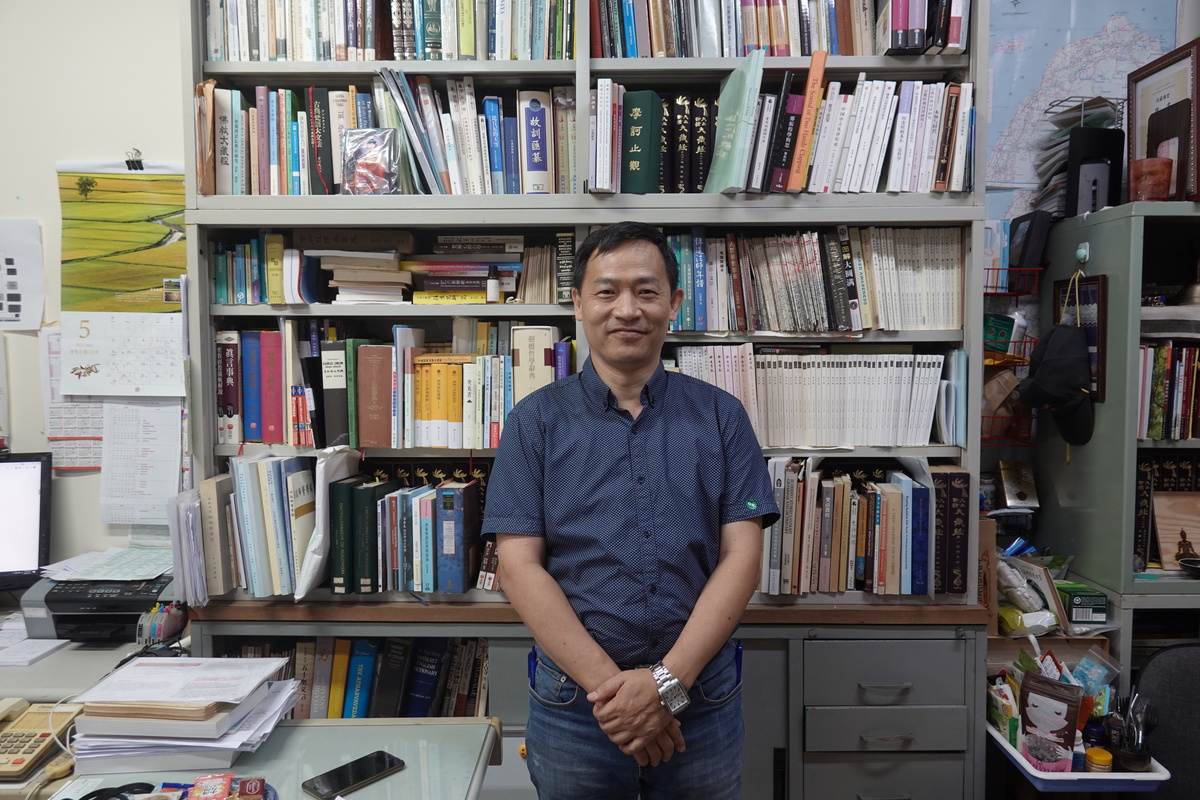How can meditation help us reduce anxiety in times of pandemic



2021-05-31
In recent days, Taiwan has recorded a spike in local COVID-19 cases and raised the epidemic alert level to 3. How to cope with anxiety caused by the sudden spread of the epidemic? Numerous recent scientific studies on Buddhist practices in psychology suggest that meditation might be one of the solutions as it can help us deal with negative emotions and achieve equanimity. “Meditation can change our mind,” says Professor of the Institute of Philosophy and the Center for General Education Kin-Tung Yit.
“Mental disorders, stress, depression have become a widespread problem and psychology is trying to solve them. Buddhism has developed its solutions as well”, said Professor Yit. He explained that there are two types of meditation: attention-based, which focuses on concentration, breathing, calmness, and compassion-based – focused on developing four qualities of mind: giving happiness to others, avoiding suffering, ability to rejoice others’ happiness, and equanimity. The first type can train the mind to be attentive and help us concentrate for a longer time, while the second reduces destructive, negative emotions and develops positive qualities of mind, he said. “This is also a way to achieve good memory and concentration, and thus enhance our learning abilities.”
In the Buddhist perspective, self-attachment is seen as a core problem causing mental disorders. “We add a lot of pain to ourselves if we concentrate on the pain. Distancing ourselves from it can help us.” Reducing one’s sense of self is the aim of many Buddhist practices – we need to realize we are part of the Universe, said Professor Yit. To develop this and other positive qualities, special training is needed. Buddhists monitor their behavior and focus on developing good qualities by practicing ‘correct mindfulness’ – focus on the here and now, and ‘correct views’ – clear comprehension of what surrounds us and how to respond to it in a positive way.
In recent years, Buddhist practices have gained worldwide popularity, especially in Western countries. However, there are significant ways in how it is practiced as the expected goals are different. “While the Buddhist meditation puts emphasis on ethics and cultivating good mental qualities, Western mindfulness simplified the traditional practice, focusing on relaxation and stress reduction” explained Yit. “Western practices mainly come from the Theravada and Zen tradition and meditation is the key point that attracts Westerners.”
The positive effects of Buddhist practices on the brain have been confirmed by numerous scientific studies, showing that a long-term practice can increase one’s gray matter volume and as well as reduce stress and anxiety, said Professor Yit. Organizations such as Scientific and Medical Network in the UK gather researchers of different fields to focus on rediscovering spirituality from a scientific point of view and engage in dialogue between science and religion to study religious practices from a non-religious point of view and incorporate them into medical or psychological systems. “Bodily and mental health is a common concern of both science and religion, though religion puts a greater emphasis on mental health,” said Professor Yit. “Science and religion have to cooperate.”
The Buddhist practice and philosophy have also been integrated into the indigenous psychology movement in Taiwan, founded by Kuo-Shu Yang in the 1980s, who “had a professional dream (…) to turn the unhealthily Westernized psychology in Chinese societies into a genuinely indigenous Chinese psychology”. This movement modifies Western theories and develops local theories, taking from such local philosophies and religious systems as Confucianism, Buddhism, and Daoism, which core is self-cultivation – the development of one’s mind and qualities, said Professor Yit.
As a religious studies researcher and a Buddhist himself, Professor Yit collaborates with scholars of the psychology field and social workers to develop a genuine self-cultivation program based on Buddhist practices to help people suffering from certain mental problems, such as stress and mild depression. “My study right now is to find how the Buddhist principles and meditation can produce joy, calm, rupture, concentration, and how they can help improve mental disorders.” He is trying to find out what Buddhist qualities can increase people’s mental baseline – the basic mental power. “People who have a good baseline will recover more quickly from mental health impacts and easily go back to their baseline, unlike those with a low baseline. “It is important to really understand and gradually develop Buddhist qualities through practice.”
Professor Yit came to Taiwan from his native Malaysia to pursue an undergraduate degree at NTNU in… Physics! “I joined students’ Buddhist Studies Society and discovered that I’m much more interested in Buddhist Studies than in Physics.” He later radically changed his academic path and ended up earning a doctoral degree in Buddhist Studies from the University of Bristol. Professor Yit has a major research interest in the dialogue between Buddhism and science and the application of Buddhist practice to psychology. One of his courses is the Practice of Western Mindfulness and Eastern Satipaṭṭḥāna.
In recent days, Taiwan has recorded a spike in local COVID-19 cases and raised the epidemic alert level to 3. How to cope with anxiety caused by the sudden spread of the epidemic? Numerous recent scientific studies on Buddhist practices in psychology suggest that meditation might be one of the solutions as it can help us deal with negative emotions and achieve equanimity. “Meditation can change our mind,” says Professor of the Institute of Philosophy and the Center for General Education Kin-Tung Yit.
“Mental disorders, stress, depression have become a widespread problem and psychology is trying to solve them. Buddhism has developed its solutions as well”, said Professor Yit. He explained that there are two types of meditation: attention-based, which focuses on concentration, breathing, calmness, and compassion-based – focused on developing four qualities of mind: giving happiness to others, avoiding suffering, ability to rejoice others’ happiness, and equanimity. The first type can train the mind to be attentive and help us concentrate for a longer time, while the second reduces destructive, negative emotions and develops positive qualities of mind, he said. “This is also a way to achieve good memory and concentration, and thus enhance our learning abilities.”
In the Buddhist perspective, self-attachment is seen as a core problem causing mental disorders. “We add a lot of pain to ourselves if we concentrate on the pain. Distancing ourselves from it can help us.” Reducing one’s sense of self is the aim of many Buddhist practices – we need to realize we are part of the Universe, said Professor Yit. To develop this and other positive qualities, special training is needed. Buddhists monitor their behavior and focus on developing good qualities by practicing ‘correct mindfulness’ – focus on the here and now, and ‘correct views’ – clear comprehension of what surrounds us and how to respond to it in a positive way.
In recent years, Buddhist practices have gained worldwide popularity, especially in Western countries. However, there are significant ways in how it is practiced as the expected goals are different. “While the Buddhist meditation puts emphasis on ethics and cultivating good mental qualities, Western mindfulness simplified the traditional practice, focusing on relaxation and stress reduction” explained Yit. “Western practices mainly come from the Theravada and Zen tradition and meditation is the key point that attracts Westerners.”
The positive effects of Buddhist practices on the brain have been confirmed by numerous scientific studies, showing that a long-term practice can increase one’s gray matter volume and as well as reduce stress and anxiety, said Professor Yit. Organizations such as Scientific and Medical Network in the UK gather researchers of different fields to focus on rediscovering spirituality from a scientific point of view and engage in dialogue between science and religion to study religious practices from a non-religious point of view and incorporate them into medical or psychological systems. “Bodily and mental health is a common concern of both science and religion, though religion puts a greater emphasis on mental health,” said Professor Yit. “Science and religion have to cooperate.”
The Buddhist practice and philosophy have also been integrated into the indigenous psychology movement in Taiwan, founded by Kuo-Shu Yang in the 1980s, who “had a professional dream (…) to turn the unhealthily Westernized psychology in Chinese societies into a genuinely indigenous Chinese psychology”. This movement modifies Western theories and develops local theories, taking from such local philosophies and religious systems as Confucianism, Buddhism, and Daoism, which core is self-cultivation – the development of one’s mind and qualities, said Professor Yit.
As a religious studies researcher and a Buddhist himself, Professor Yit collaborates with scholars of the psychology field and social workers to develop a genuine self-cultivation program based on Buddhist practices to help people suffering from certain mental problems, such as stress and mild depression. “My study right now is to find how the Buddhist principles and meditation can produce joy, calm, rupture, concentration, and how they can help improve mental disorders.” He is trying to find out what Buddhist qualities can increase people’s mental baseline – the basic mental power. “People who have a good baseline will recover more quickly from mental health impacts and easily go back to their baseline, unlike those with a low baseline. “It is important to really understand and gradually develop Buddhist qualities through practice.”
Professor Yit came to Taiwan from his native Malaysia to pursue an undergraduate degree at NTNU in… Physics! “I joined students’ Buddhist Studies Society and discovered that I’m much more interested in Buddhist Studies than in Physics.” He later radically changed his academic path and ended up earning a doctoral degree in Buddhist Studies from the University of Bristol. Professor Yit has a major research interest in the dialogue between Buddhism and science and the application of Buddhist practice to psychology. One of his courses is the Practice of Western Mindfulness and Eastern Satipaṭṭḥāna.
Click Num:
Share
